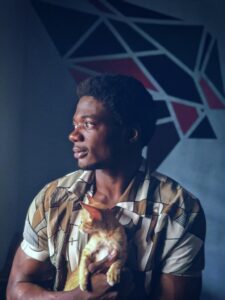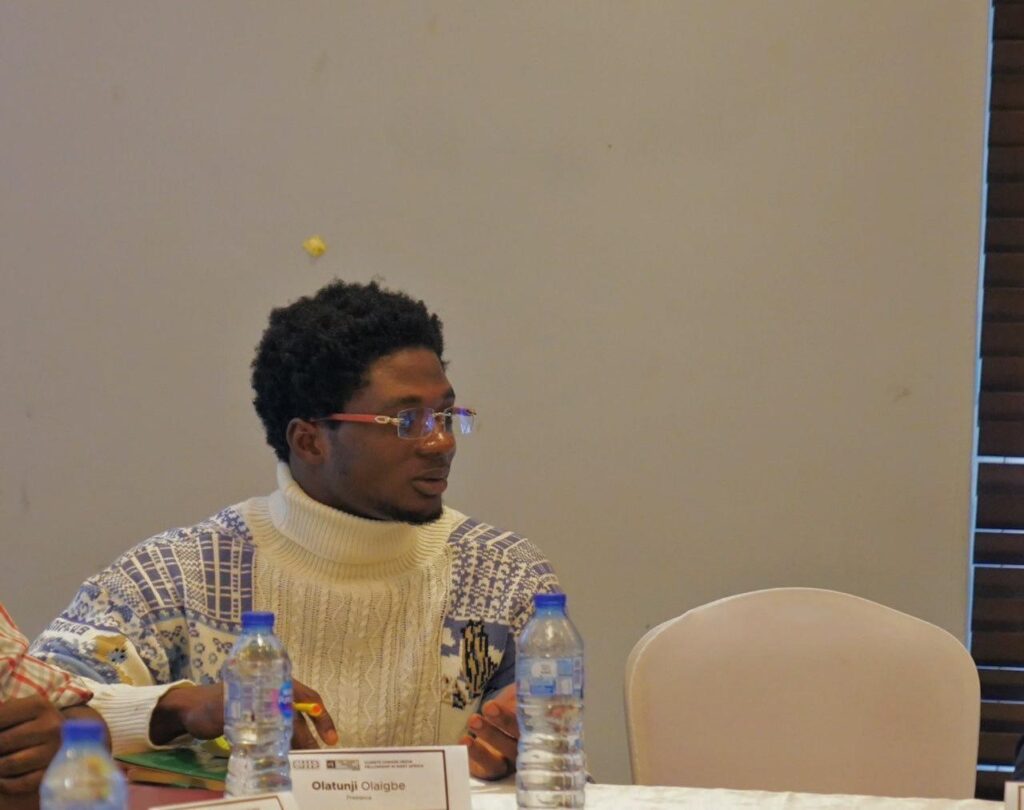Olatunji Olaigbe is an international freelance journalist and the Editor-in-Chief of the Union of Campus Journalists, University of Ilorin.
The winner of the 2021 IOM West and Central Africa Migration Journalism Awards, his reports have been featured in a variety of publications, including Al-Jazeera, Vice Magazine, WIRED, The Record by Recorded Future, HumAngle, Rest of World, IJNet, and Inkstick Magazine, among others.
Olatunji writes a monthly cybersecurity in Africa column for Inkstick Magazine and contributes as a junior producer to the Connected Culture Podcast, which is a podcast looking at the unusual ways society collides with human culture, socio-economics, and behaviour.
The young writer recently launched Àgírìkì, a bi-weekly newsletter reporting nuanced stories relating to agriculture and the global food system is a 4th-year student at the University of Ilorin, studying Agricultural Extension and Rural Development.
Our Correspondent, Peace Oladipo spoke to Olatunji about his career as a freelance journalist and making an impact with international stories despite being an undergraduate.
I see you are making waves as a journalist, when and how did you start journalism?
I started writing as a sort of career almost as soon as I got into university, and started taking lessons in journalism because I thought it’d make me a better writer. I loved good storytelling and at some point wanted to win or be shortlisted for the Commonwealth prize. I competed in the 2019 Unilorin Students Union Writing Workshop and Competition, then organized by Akinyemi Muhammed, Princely X, now the editor-in-chief of Zikoko Citizen. I started speaking with Akinyemi back then and some weeks later, he told me about a workshop organized by Olakunle Ologunro, I registered and got in for that (I wrote the worst things compared to all the other participants). I also attended the Incendiary workshop, also organized by Princely. It featured classes on poetry, copywriting, and journalism – taken by Kunle Adebajo, a journalist(then while he was dealing with the issue with Unibadan) and Caleb Somtochukwu (just starting Minority Africa then). Many of these guys were just starting, but they had that spark and I think I caught a bit of that from them. Those early experiences made me want to become a storyteller.
They changed me from a student fresh in university, looking for extra-curricular activities to someone with a defined path. I wanted to become a good storyteller, so I could tell stories for brands, nonprofits, and think tanks.
But even then, I was more of an essayist than a creative writer. I loved to approach creative writing from a well-grounded perspective. What could I write and possibly, change about reality? I’d say I was a bit naïve then.
I used to read a lot of New Yorker and The Times, those deep features with elaborate storytelling. I also had a habit of reading recommendations from Longread and The Open Notebook, which is a science journalism think-tank-like outlet.
So, learning journalism was me trying to demystify that storytelling. It was profound. I started reading books, taking courses, and speaking with journalists that I admired. The Open Notebook was especially a great place for me, I’d read a story and the interview – called behind the story – with the journalist who wrote that story. Sometimes, I even got to read the pitch that became that story.
So I did the learning phase for a while and eventually, it was just natural to want to put these things to practice.

You are studying a course that is far from writing, communication or journalism. How did you find a place in journalism and discover the tech and environment beat?
I am studying Agriculture at the University of Ilorin. I did JAMB twice and both times chose to study agriculture. And I was elated when I got in the second time.
I have a long and complex relationship with Agriculture. I loved it, but school and harsh realities made it weird for me. But while I was doing all that learning about writing, I discovered agricultural journalism. I started applying to be a volunteer writer/storyteller for some organizations. In late 2020, I was commissioned by a popular agriculture publication to write a story on how a lot of students studying agriculture in Nigeria do it because they have no other option, and how that contributes to a lack of passion for the subject.
I reported that piece, I’d say poorly, but I enjoyed the process. I enjoyed hearing other people tell me about their dreams and desires and how the Nigerian education system can be frustrating, and me trying to retell their stories in the most relatable way I could. That said, the publication was very lax with the process of that piece, so I at some point forgot about it (until they reached out in the middle of last year).
I also got this commission from a food magazine to write about palm wine the next year, but apart from those two, it was hard getting to write about agriculture, especially in the storied way I wanted to. I started writing about other things, on the subject I next understood the most, the environment. Agriculture is somewhat intertwined with the environment, and I had a decent amount of knowledge about that.
I did some portfolio-boosting work and started writing pitches, and that was it. I was sending pitches to local outlets and newspapers, then I switched to international pubs at some point.
READ ALSO: ‘My adventurous campus journalism story’
I wrote a lot of pitches and got better at it, I was writing around 3 pitches a week at some point, and mostly getting replies on none. One day I got commissioned for a piece with GameDaily, HumAngle, then the wine story, then VICE—I’d say those were my zero to one story.
I got into tech by chance. After that long closure of universities during the pandemic and strike, I witnessed a lot of students – including my friends – turn to cybercrime, and always pitched this story to pubs because it was somewhat personal. I did not get that piece published until late 2021 and that was my first tech publication and my first long-form.
After that piece, I became a stringer for the publication and did a couple of techs reporting for them. That was how I started tech.
How did you make it to the international media/journalism space despite being a student?
Oh, I think freelancing is the new early career. I was trying to learn, and gain experience, and freelancing seemed like the perfect place for that because I could not commit full-time as a student.
I’d say luck and grit, and just trying to understand the space. I was reading a lot of international publications, and I still do. I read a lot, so I understood that perspective and storytelling are needed. But I was also lucky to have met some understanding editors, like Andrea, Anita Eboigbe, Allyn, and Natasha… These editors understood I was a student and took the pain to actively steer my reportage to be better. I learnt a lot from them, a lot.
By extension, there’s also a lot of motivation at the University of Ilorin. I met guys like Ope Adetayo, Pelumi Salako, and Ahmad Amobi at that 2019 Kunle Ologunro Workshop, and we sort of became friends from there. They served as some sort of support. I remember Ope and Princely once helped me shape what my pitch should look like. I can’t count how many times I’ve asked Salako for a mail or to help finetune an idea or something. Sometimes we hang out to unwind but instead talk about work and editors and journalism. I’d say that community was very crucial to how I broke into the international journalism scene.
I see you are into tech reporting, can you rate Nigerian reportage of technology?
Tech reporting is doing pretty well in Nigeria, especially when you consider just some years before. I can easily say the most vibrant beat in Nigerian journalism now is tech journalism. There are a lot of young publications and reporters doing these amazing stories and bringing much-needed perspective to both local and international media consumers. Look at outlets like TechCabal, TechNext, and Techpoint, and you look at how our legacy outlets like Vanguard, Guardian and Punch are trying to incorporate tech reporting. Check out the works of a new generation of tech reporters like Ganiu Oloruntade, Sultan Quadri, Adebola Makinde, and Johnstone Kpilaakaa, and then you look at the works of seniors like Alex Onukwe and David Adeleke. These guys are doing stories that I can argue were unimaginable years ago, and you don’t know the value of what they’re doing until you sit in stakeholder gatherings and hear their works being cited and you see how it’s helped form a perspective that view tech, and by extension, young Nigerians, as vibrant, complex, and innovative people, and shows the tech industry in its entirety.
It’s exciting. Tech reporting in Nigeria is still far from where it can be, but it’s getting there fast and I’m glad to be a part of that movement. I think for the next few years, apart from very few outliers, tech journalism will be the innovation point for journalism in Nigeria.
You write about issues in Nigeria and you are in campus journalism like some other campus journalists. Is it okay that campus journalists are now leaving their primary place (the campuses) in national or international space?
Interesting question. I think campus journalists should try to work for outlets beyond their campuses. It improves your skill, tenacity, and creativity, and by extension, you understand the “politics” of journalism more. You understand to frame better stories and have more impact too.
The argument that campus journalists are leaving their “primary” place is flawed because it disregards how hard it is to be a campus journalist in Nigeria. I’m the editor-in-chief of a campus outlet and I can tell you I have more freedom as a freelance field reporter than I do as the editor-in-chief of a campus outlet, and historically, Nigerian journalism gatekeepers who argue that campus journalists should remain campus journalists are often the same ones who’ve done little to advance campus journalism in the country.
Sometimes I speak at conferences with other reporters and editors of international campus outlets and I’m awed at the kind of freedom they have. Kunle Adebajo was expelled for reporting a true story, nobody did anything to the school. Now and then, I have reporters in the UCJ who want to tell a daring true story and I have to explain to them that there’s no freedom or fund to report that story. It’s heartbreaking.
I try to encourage campus journalists who are good to try out mainstream publications because it builds their skills more and offers a lot of freedom to do work that is appreciated.
If they go to mainstream journalism and it consumes them so much it makes it hard to be a campus journalist, good. Campus journalism is very important, but let’s stop pretending like the system is not rigged and that it’s a better experience working mainstream.
I also by extension think that this stems from the Nigerian (journo) perspective that you should suffer greatly and go through certain steps before getting to certain places. These “campus journalists” are doing good work that brings a very radical perspective to journalism, we don’t talk about that. These guys are doing important work and it hurts that the only thing some people are seeing is that they should rather be risking their education writing barely-read stories for campus outlets.
Great things can come from and are coming from dorm rooms. Deal with it.

What do you think the national media must do to compete with the international media?
This is tricky. I’d say encourage more young people and innovation. You can easily look at the trailblazing outlets in Nigeria at the moment and see that they’re led mostly by young and innovative people.
Nigerian publications have a habit of not valuing young journalists. I have friends who work in local outlets and they tell me you need at least 2 years in a publication before you can write a front-page story or image. I pitched a couple of Nigerian outlets early in my career and except for HumAngle, I would not want to repeat that experience.
I just think international media value the work of younger talent more than local media, and in a country where the young are most of its population, the person with the young perspective wins.
What motivates you to write?
(Glad to be out of the tough questions.)
I write for clarity and creativity. I started writing when I was eight or so. I used to dictate regurgitated fiction to my younger brother and he’d write it down because he had much finer handwriting than mine (I have the worst handwriting I have ever seen).
I had really bad dyslexia and dyscalculia (some people argue that I was just dumb and unintelligent) as a kid, and could not read until I was in primary 4 or so. So bro, when I discovered stories, my head blew into literal pieces. I couldn’t stop reading.
I have a very busy mind, I’m one of those people who are easily distracted and always trying to do too many things at a time, but my mind is clear when I’m writing. It’s like there are pieces of me scattered in different directions and writing gathering every bit into one lane.
You innovated something recently. What is Àgírìkì newsletter about?
I’m hoping it becomes more, but for now, it’s a newsletter where I (make attempts to write) humane stories about agriculture and the global food system. It’s my attempt at reclaiming my passion for agriculture, but also a very good place to be if agriculture or (attempts at) good storytelling are your thing.
Are your international stories impacting the nation as it is supposed to?
Hmm, tricky question. Impact is a weird thing to measure in journalism, so I like to measure my impact in terms of how many minds I changed. I have a decent history of people reaching out to me saying “hey, I read that story, I never knew XYZ here is…” I also know stakeholders there taking notes when I write stuff because they start sending me their PR mails.
Then secondly, how well did it resonate with the people whose story I’m telling. Do they feel represented? I find deep fulfilment in writing a story and someone reaches out because they felt represented.
On international platforms, I think there’s a lot of minds to change. There’s a lot of people who do not understand the nuance of certain situations in Nigeria, and international platforms give you access to those people.
What’s your advice to campus journalists?
Your work is important, act like it. Go and stay where you feel valued, then try to give back that value as much as you can allow yourself.

